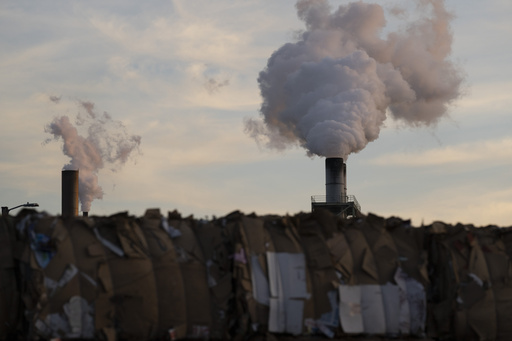
SEATTLE — A significant legislative measure mandating reductions in carbon emissions while generating substantial revenue for climate initiatives in Washington state may face repeal by voters in the upcoming fall election, less than two years post-enactment.
The Climate Commitment Act is known for being among the most progressive environmental policies implemented by a state government. However, it has come under scrutiny from conservative factions, who argue that it has led to increases in energy and fuel prices, with Washington currently experiencing the third-highest gas prices in the United States. The objective of the law is to cut emissions to nearly half of 1990 levels by 2030.
Under the Act, businesses that emit at least 25,000 metric tons of carbon dioxide or equivalent greenhouse gases must acquire “allowances” that permit them to release such emissions. Each allowance corresponds to one metric ton of greenhouse gases, and the total number of allowances available for purchase diminishes annually, compelling companies to seek ways to lower their emissions.
Advocates for the Climate Commitment Act assert that repealing the law may not correspond to a decrease in costs and could jeopardize crucial state revenue intended for forthcoming climate programs. Funding sourced from polluting enterprises could support various initiatives, including air quality improvements, conservation of fish habitats, wildfire prevention, and clean energy projects.
“The overarching aim is to tackle climate change and reduce carbon emissions,” stated Todd Donovan, a political science professor at Western Washington University. “Yet when you come down to the concerns of voters, it becomes a matter of how this affects my gas taxes.”
The repeal movement is spearheaded by the group Let’s Go Washington, which claims that the carbon pricing policy has led to an increase in gasoline prices by 43 to 53 cents per gallon, referencing data from the conservative Washington Policy Center. Over recent months, the group, financially supported by hedge fund executive Brian Heywood, has conducted numerous outreach events at fueling stations to oppose what they designate as a “hidden gas tax.” During an event in Vancouver, the group temporarily reduced gas prices by $1 to demonstrate what less costly prices could look like.
“It’s elevating costs across the board since everything is transported via truck,” said Hallie Balch, a spokesperson for Let’s Go Washington, in a video discussing the initiative last month.
Current trends at gas stations show that the typical cost for regular fuel has peaked at $5.13 per gallon since the auctions commenced in February 2023, though prices have since moderated, settling at $4.05 this month, according to GasBuddy reports. Notably, the state recorded a historic average high of $5.54 before the auction process began.
Supporters of the carbon pricing policy have highlighted the diverse array of programs it finances, which could be in jeopardy should the repeal prevail, including efforts to assist Native American tribes in addressing climate challenges, community clean energy projects, and tackling air pollution issues.
The Office of Financial Management warns that without the carbon pricing framework, Washington could face a loss of $758 million in upcoming state revenue for the next fiscal year and approximately $3.1 billion over the next four years. Recently, state legislators enacted a budget for fiscal year 2025 that included multiple programs funded by revenue generated from carbon pricing, with numerous provisions becoming ineffective should the law be dismantled.
Following California, Washington was the second state in the nation to initiate such a carbon pricing program, starting with ambitious emission reduction goals of 7% annually, tapering off post-2031. A repeal could disrupt plans to integrate Washington’s carbon market with comparable systems in other states and hinder its contributions to the establishment of similar initiatives elsewhere.
A wide range of stakeholders, including federally recognized tribes in Washington, major tech companies, national environmental organizations, and public figures like Bill Nye, support maintaining the carbon pricing framework. Notably, BP America, which is slated to partake in the auctions, has donated over $2 million to the advocacy campaign, citing prior support for the legislation and a desire for its continuance.
The fuel corporation is likely motivated by the prospect of regulatory certainty that would assist in their strategic planning, according to Aseem Prakash, director of the University of Washington’s Center for Environmental Politics.
Supporters for the law have successfully raised upwards of $16 million in funding, significantly exceeding the approximately $7 million raised by the Let’s Go Washington campaign aimed at this and six other related initiatives. The repeal proponents have gathered over 400,000 signatures to place Initiative 2117 on the ballot for November’s election.
